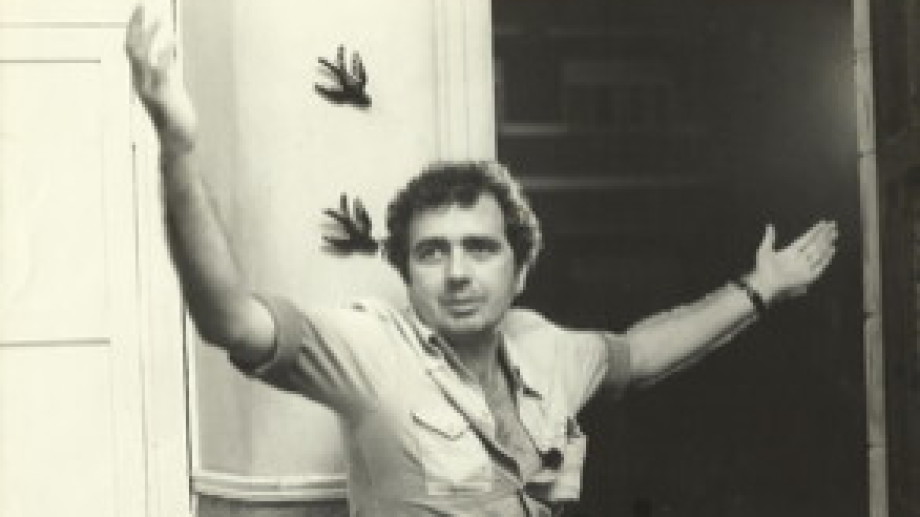
Carlos Diegues on the set of Chuvas de verão (Summer Showers) in 1978
Occupation: Filmmaker
Sign: Pisces. Born March 19, 1940 in Alagoas (Brazil)
Nickname: Cacá
Favorite color: Unknown
Background: “Along with Nelson Pereira dos Santos, Carlos Diegues represents the last link with the Brazilian film movement known as Cinema Novo (“New Cinema”), which now seen historically was easily the most influential film movement in Latin America over the past 50 years,” former Film Society program director Richard Peña explained recently via email. “Its stirring mixture of formal experimentation and provocative politics challenged both the models of Hollywood cinema and the European art cinema of the time, as it searched for its own unique approach to filmmaking, powerfully influencing Latin American and other filmmakers.”
As a child, Diegues moved to Rio de Janeiro with his family and quickly became interested in movies. He grew up focusing on cinema and soccer. “I was a born film buff, I used to go to the cinema almost every day. I loved watching films so much, I decided to make one,” he told the Cannes festival website last year. “The first time I went to the cinema, I was 6. I looked at the screen, and I was totally hooked. In fact I was simply astonished and I thought, don’t touch the screen or you'll get stuck. But I'm still stuck!”
Diegues bolstered the Brazilian film community as he gained prominence for his work in the country.
“Carlos Diegues was one of the chief architects of many of the policies that led to the creation of the various Brazilian government initiatives in the 70s and 80s that helped transform that cinema into the most prolific and most internationally seen in all of Latin America,” Richard Peña elaborated.

Carlos Diegues on the set of Tieta do Agreste (Tieta) in 1996
Of the Cinema Novo filmmakers who were portraying popular culture in Brazil, Diegues is credited with being the first of the group to capture the country's under-explored Afro-Brazilian heritage. Brazil's black history can be seen in such work as Ganga Zumba (1963), Xica da Silva (1976) and later in Quilombo (1984).
“I think there is only one hope for Brazilian cinema: to be Brazilian,” Diegues said in an interview in the mid-90s. “If it tries to copy or be like world cinema, it will lose out.”
Diegues' work is considered political cinema, particularly the films he made during the years of military rule in Brazil.
“Regarding his own work, for me the films of Carlos Diegues have often been about the space, or the contradiction, between 'myth' and 'history', or perhaps 'reality,'” explained Richard Peña. “A film such as Quilombo is situated somewhere between the legend of of Palmares—the 'kingdom' of runaway slaves in the northeast of Brazil that lasted one hundred years—and the reality of it as it's come down through historical research. Bye Bye Brazil is about the myth and the reality of Brazilian underdevelopment.”
In recent years, Diegues has served on juries and considered future filmmakers, as well as his own work.
“I have no nostalgia for the past, I want to make films of the present,” he said last year in an interview. “I think that’s our duty, as filmmakers, to make films about ourselves and our contemporaries, so that’s my main criteria. Even a historical film can speak about the present.
Essential films (recommended by Richard Peña): Ganga Zumba, The Big City, Xica, Bye Bye Brazil, Quilombo, Rio's Love Songs

Carlos Diegues on the set of The Greatest Love of All in 2006
Filmography:
Nenhum Motivo Explica a Guerra, 2006
The Greatest Love of All, 2006
God Is Brazilian, 2003
Orfeu, 1999
Tieta do Agreste, 1996
Veja Esta Canção, 1994
Dias melhores virão (Better Days Ahead), 1988
Um Trem para as Estrelas, 1987
Quilombo, 1984
Bye Bye Brasil, 1979
Chuvas de verão (Summer Showers), 1978
Xica da Silva, 1976
José Carlos Pace, 1975
Cinema Iris, 1974
Joanna Francesa, 1973
Quando o carnival (When Carnival Comes), 1972
Receita de Futebol, 1971
Os Herdeiros, 1971
Oito Universitarios, 1967
A Grande Cidade ou As Aventuras e Desventuras de Luzia e Seus 3 Amigos Chegados de Longe, 1966
Ganga Zumba, 1963
Escola de samba (Samba School), 1962



